#bungie chose VIOLENCE
Photo



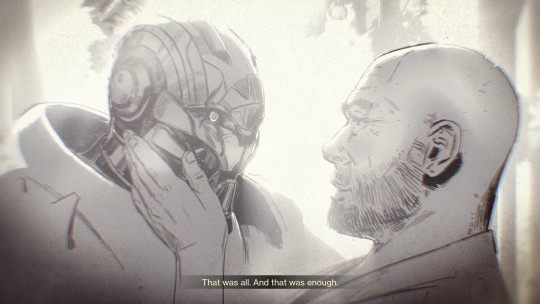
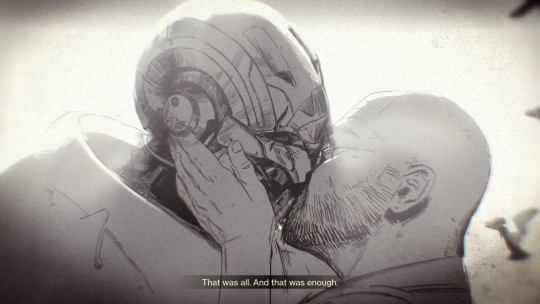

bungie: yes saint-14 and osiris are gay. we just don’t put a lot of emphasis on the romance because destiny isn’t a love story.
russia: we censored saint calling osiris "my love.”
bungie:

#jem blogs#d2 spoilers#destiny 2 spoilers#season of plunder spoilers#destiny 2#season of plunder#osiris#saint-14#o14#bungie#bungie chose VIOLENCE#for context on the quote it was robert brookes who said that i believe#he said that o14 is very personal to him and that's why he wanted them to be gay#but he also said destiny isn't a love story which is part of why they never really focused on it#HOWEVER that was about two years ago#so things clearly changed#AND WE LOVE TO SEE IT!!#(also idk if it was russia censoring o14 that convinced bungie to do this i'm mostly joking#though i wouldn't be surprised if it wasn't A reason)
264 notes
·
View notes
Text
I see
Bungie woke up and chose violence today :)
I'm totally
completely
fine
2 notes
·
View notes
Text
It’s not ours
I’ve seen people refer to the Traveler a few times as ‘ours’ or how the Hive tried to ‘take it from us’. Which would follow, since that was pretty much the reaction of the Vanguard in-game and the angle Bungie took with the marketing for the expansion.
The Light isn’t ours. Nor is the Sky. Nor is the Traveler. Merely because the Traveler chose to make her stand at Earth does not give humanity the ultimate right to make decisions for the Traveler or to exert our control of her. The Traveler gifted us the Light, it didn’t swear to be ours and ours alone.
Consider the wager. The Sky stands as gentle complexity. A good kingdom ringed by spears, where the strong defend the weak and life blooms in multiplicity. The Deep stands as the blade edge, the kingdom of war, that eliminates all life until there is only the last man standing.
By that Wager, the Traveler gifted us the Light. Upon us were weighed no demands and restrictions were not emplaced. The Light is to do with as we will, because it is will that the Sky loves. Choice and the freedom of it. When warlords rampaged in the Dark Ages - did the Traveler chastise them and tell them no? When Rezzyl Azir threw down his burden and turned his face from the Sky, did the Traveler yank hard his reins and tell him ‘no’? When the Iron Lords slaughtered the warlords, when they crushed ghosts underfoot to break the cycle of violence, did the Traveler chastise them for not finding another way?
What we do with the Light is what is meaningful. For good or evil, right or wrong, each action and choice we take is precious and so the Traveler cannot, will not, speak. To speak would be to influence us and tarnish that precious choice.
By contrast the Deep commands. Though it gave us stasis, it constantly speaks to us, gives us hints, eggs us on, teases and leads us. It has demands of its own and what we want is not secondary - it is immaterial.
This may seem an aside, to explore the purpose of Deep and Sky, but I am illustrating a picture.
The Sky wishes for rich life and vibrancy of disagreement, of concord, of strife and peace. The Sky wishes for life, in all it’s beauty and pain.
When we claim the Traveler as ours, when we claim the Light as ours, when we look at the Lucent Hive with trembling limbs and curling lips and find palms on stocks and blades aquiver, we are asserting the Deep claim.
We are saying that “We alone are right. We alone are mighty. We alone may be the only Shape.” The Deep demands a single champion, the Light cherishes a billion. For us to jealously hoard the Light and the Traveler is to make us into the only champion of the Light. We are perverting it’s purpose.
Does it mean it is wrong that we fought off the Fallen, that we warred with the Cabal, that we threw down the Osmium Dynasty?
No.
For that is the freedom of choice the Sky desires for us. And besides - they wanted us dead first. It is never morally wrong to fight for your life.
But the Traveler is showing us a truth. We are beloved, we are precious - and so is all life. Perhaps humans did indeed have a spark that caught the Traveler’s eye, all those centuries ago, which is why She laid down here to fight.
But it was hubris to ever think that the Light would be ours alone. Ghaul was not deserving of it, because he demanded it, because he tried to steal it, because he impugned on free will.
Savathun chose to die. She accepted her fate, she took all her cards off the table, she threw them away. She wanted the Light, yes, but she did not demand it. She did not hold the Traveler at gunpoint, she did not try to tear Light from it’s body. She asked, and she died.
At the end of her long, long life, Savathun finally had faith.
Now the Lucent Hive are blessed. Truly blessed. No tricks, no stealing, no magics. And we war on them.
Again, that is not inherently wrong. The Light is freedom. For us to clash is natural. But the other side of the coin demands recognition too. The Lucent Hive are just as worthy as we to wield the Light. So while we may fight and while we may be at odds, the day will come when we must expect, and should expect, not to be. For the Light is not ours, and it is not theirs. It is the Light, it is given, and none can claim it solely. To do otherwise is to mantle the Deep, and that is a path none should tread.
We were asked to survive the truth, and it was not what was implied. The truth to survive was that all things change and that our humility should be reminded to us. The truth that our precepts were wrong. The truth that we always knew, but maybe had set aside.
We serve the Light. The Light does not serve us.
#destiny#destiny 2#destiny 2 witch queen#witch queen#the traveler#the sky#the deep#the light#guardians#the vanguard#savathun
528 notes
·
View notes
Text

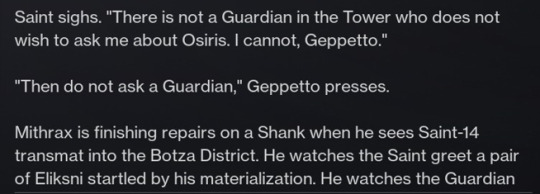
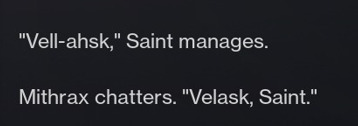


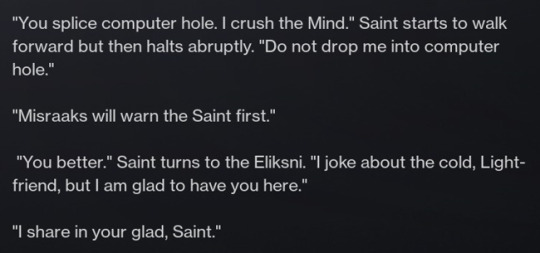

These are some parts from page 2 of the Ripples lore book which still isn't live on Ishtar.
Bungie chose violence with this. I legitimately cried. Don't even know what else to say.
#destiny 2#destiny 2 spoilers#season of the lost spoilers#saint-14#mithrax#PIGEON AND THE SPLICER REALLY BUNGO#you dare mirror pigeon and the phoenix in front of my eyes#saint speaking eliksni........#SAGIRA IS BELOVED BY THE ELIKSNI DON'T EVEN LOOK AT ME#saint and mithrax together in his ward of dawn :)#:)))#I am ended. my life is forfeit#HUGE fear tho over them looking for sagira's remains#what if the remains are not there anymore#help me
356 notes
·
View notes
Text
bungie chose to enact violence by releasing the caramelldansen emote
5 notes
·
View notes
Photo


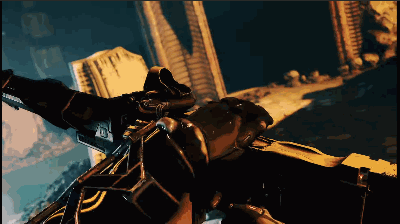

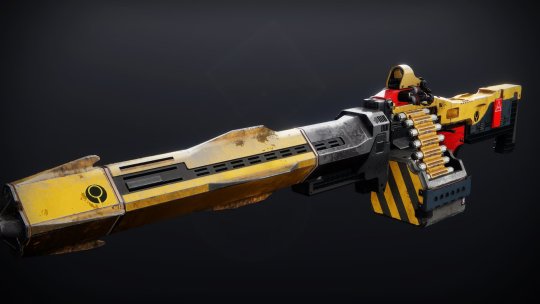
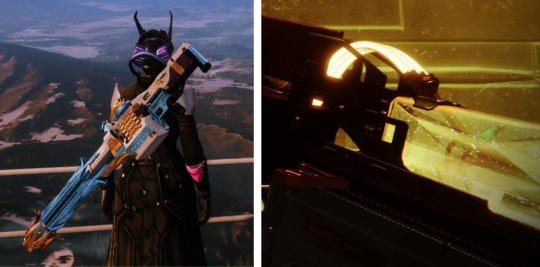

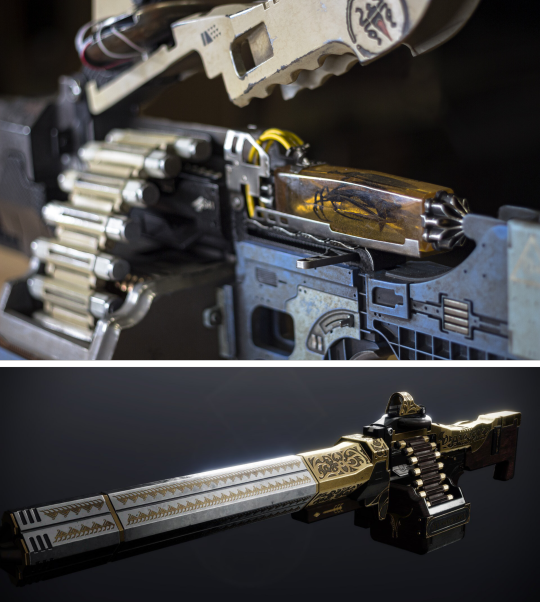
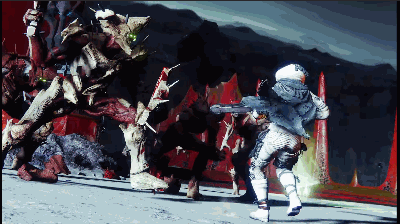


Xenophage
This might sting a little.
Type: Machine Gun
Slot: Kinetic | Energy | Heavy
Element: Arc | Solar | Void
Perk: Pyrotoxin Rounds - Fires high-powered explosive ammunition.
Ornaments: A Better Specimen, Glee Barrage, Homesteader, You Think You're Big Time?
Origin & Description: Good news: Xenophage is a great gun!
Bad news: that’s because it has a Hive bug in it.
But good news: the bug is our friend!
But bad news: literally.
I should explain.
Xenophage, like Whisper of the Worm, is a gun made from what used to be - and on some level still is - a living entity. But while Whisper is a Hive god who changed itself into a weapon so it could eat our kills, Xenophage is built around a strange little Hive bug we found in the Pit of Heresy that is our friend. Well, technically, it’s Eris’ friend. It’s all that’s left of the Guardian Omar Agah, member of the ill-fated First Crota Fireteam. Omar was captured by the Heart of Crota, a Hive wizard who hung him up and used him as a drip-feed of Light to hatch infant Hive. Thing is, some Hive wizards also used the chance to experiment with a living Guardian, and in one case it seems they peeled out his Light into a weird little bug-carrier and kinda...pulled Omar’s soul along for the ride. Yeah. So...some part of him is still in there, and it knows who it is - who it was - and what’s going on, and it...it mad, my dudes. It real mad. It’s ten pounds of whoop-ass in a ten-ounce bag and compacting all that fury into its current insectile abode has in no way mitigated Omar's desire to absolutely ruin some Hive.
Xenophage comes from a Shadowkeep quest that sends players tracing a strange thread of Light all the way deep into the Pit of Heresy on the Moon to find this little bug friend chilling down there. After we defeat the boss hovering over it and bring our new buddy back to Eris she recognizes Omar and goes “okay uh wow not sure what the protocol is here,” but she’s still a Guardian so naturally her solution is: a gun. Eris wires up Omar’s new form to his own machine gun (which she kept as a memento because, again, Guardian) and behold: Xenophage. Much like Xol/Whisper or the hunger-essence bound into Bad Juju, bug-Omar is willing, in fact eager, to come along and be a gun for us. He wants his vengeance “in this life, not the next.” But it still sketches me out big time. At least Omar just wants to roast some Hive and isn’t eating our violence...that we know of...
Bungie chose to preview Xenophage unusually early for an exotic - a solid 3 months before Shadowkeep's launch - and in an unusual way: it made its debut at GuardianCon 2019 in the form of an exquisitely-detailed full-sized replica complete with hinged cover lifted to reveal the alien bug inside (shown above). Ironically it was named unusually late; it was still labeled "$MACHINEGUN0.NAME$" in demos barely a month before launch, even though the rest of the text had been finalized down to the pull quote. Players got into the habit of calling it "the bug gun" and you're still just as likely to hear that instead of its actual name. We got some cool extra insight into Xenophage's design process from Bungie concept artist Dima Goryainov who posted some draft material on Twitter. Apparently Xenophage started with the core concept of "human weapon enhanced by hacked alien bio-battery," which became the bug in its block of pseudo-amber, and lore-writers further refined that idea into the final resting place of Omar Agah's soul.
We can assume this weapon wasn't exactly shooting spitballs while carried by its original owner, but it's bug-Omar's fury patched into the system that now juices Xenophage up to boss-shattering levels. And shatter bosses it will. At first glance it seems weird that a Hunter like Omar would favor a machine gun - it’s not their style. It makes a lot more sense once you take Xenophage out for a spin and realize that, like Sweet Business, its weapon archetype is more for game mechanics than an accurate description. Just as Destiny classifies Sweet Business as an Auto Rifle because it doesn’t have a slot for “gatling gun,” it calls Xenophage a Machine Gun because there’s currently no slot for “anti-matériel rifle.” Xenophage’s closest real-world equivalent would be a fifty-cal, pretty much the heaviest a rifle gets before it has to be mounted on a vehicle. As the “matériel” in the name implies, anti-matériel rifles are meant to target not individuals but inconvenient obstacles such as vehicles, other large weapons, and the less-sturdy kind of walls. A Hunter with a weapon like Xenophage would probably infiltrate enemy territory ahead of time to aid in an ambush or take out a key target so other Guardians could advance.
Xenophage still fires full-auto like a machine gun, but at a glacial 120 rounds per minute - the next-slowest fire at 360 RPM - and can only hold a paltry 13 rounds in its magazine. But it outranges most other MGs and definitely out-impacts them. Xenophage's rounds punch your enemies backwards with solid explosive damage that doesn't change based on whether you land a precision hit, so as long as you can see the target you can start hammering away with spine-cracking force. With the changes to Honed Edge making Izanagi’s Burden drop in the DPS rankings, Xenophage's percussive rampage sat firmly in the top three for raid boss damage for a decent time. Witch Queen in February 2022 pushed it out by dropping its fire rate to an abysmal 90 RPM, but the nerfhammer eased up a bit a season later and it's back up to 100 RPM, making it a solid if not extraordinary option.
Whisper of the Worm, Bad Juju, Xenophage - are there any other guns we made out of people? An argument could be made for 1kV, Witherhoard fires harvested Taken goo, Deathbringer is literally made of bones, and Merciless was designed around a caged AI from the get-go. We seriously need to stop turning people into guns. But they just make such good guns...
If you feel like polishing up Omar's ride, you can apply A Better Specimen to update Xenophage with a brand-new weapon frame done up in the insignia of the First Light expedition, the abandoned Golden-Age lunar complex that unearthed the first Pyramid ship (long story. it didn't turn out great.) The Homesteader ornament gives it the usual Tex Mechanica frontier flavor and You Think You're Big Time?, part of the 30th Anniversary collection, reskins it like the old Bungie game Marathon. But if you really feel like dressing up, put on the gleaming blue & gold Glee Barrage, a Dawning ornament for Xenophage that softens its boxy lines and, most importantly, puts a hat on Omar. I am not making this up. I want you all to know that I spent significant time in-game finding places to stand with different lighting and reloading Xenophage over and over so I could personally confirm to you, the reader, that not only is Omar the bug wearing a tiny little elf hat, but also that that hat is a cheerful bright green. Happy Dawning, Omar! Let's get cracking.
Destiny 2 Compendium Armarum Exoticarum
[ Ace of Spades | Ager's Scepter | Anarchy | Arbalest | Bad Juju | Bastion | Black Talon | Borealis | Cerberus+1 | The Chaperone | Cloudstrike | Coldheart | Collective Obligation | The Colony | Crimson | Cryosthesia 77K | DARCI | Dead Man's Tale | Deathbringer | Dead Messenger | Devil's Ruin | Divinity | Duality | Edge of Action/Concurrence/Intent | Eriana’s Vow | Eyes of Tomorrow | Fighting Lion | The Fourth Horseman | Forerunner | Gjallarhorn | Grand Overture | Graviton Lance | Hard Light | Hawkmoon | Heartshadow | Heir Apparent | The Huckleberry | Izanagi’s Burden | The Jade Rabbit | Jötunn | The Lament | The Last Word | Legend of Acrius | Leviathan’s Breath | Lord of Wolves | Lorentz Driver | Lumina | Malfeasance | Merciless | MIDA Multi-Tool | Le Monarque | Monte Carlo | No Time to Explain | One Thousand Voices | Osteo Striga | Outbreak Perfected | Parasite | Polaris Lance | Prometheus Lens | The Prospector | Queenbreaker | Rat King | Riskrunner | Ruinous Effigy | Salvation's Grip | Skyburner’s Oath | Sleeper Simulant | Sturm | Sunshot | SUROS Regime | Sweet Business | Symmetry | Tarrabah | Telesto | Thorn | Thunderlord | Ticuu's Divination | Tommy's Matchbook | Tractor Cannon | Traveler's Chosen | Trespasser | Trinity Ghoul | Truth | Two-Tailed Fox | Vex Mythoclast | Vigilance Wing | The Wardcliff Coil | Wavesplitter | Whisper of the Worm | Wish-Ender | Witherhoard | Worldline Zero | Xenophage ]
#Destiny 2#Xenophage#Omar Agah#bug gun!#Shadowkeep#Destiny Compendium Exoticarum#Destiny#this is the wager of existence
20 notes
·
View notes
Note
18 for the fantasy writing prompts? :D
Prompt: “This dagger right here? Yeah? You see this? You see this right here?Guess what? I murdered your family with it.”
Summary: Virgil is a Guardian--those chosen by the Traveler to protect the remaining strands of humanity from the Darkness. Or rather, the numerous alien races running around hellbent on destroying what's left of Earth. Together with Remy--he runs recon missions for the Vanguard, the governing body of the Guardians.
His latest mission goes smoothly until a swarm of Vex shows up. So many blinking red lights headed straight towards him. Somehow, they know. The Vex know a lot of things. They were a ruthless hive mind with the access of time manipulation the likes of which the galaxy has never seen.
It isn’t too far-fetched to assume they know where he is based on the thousand other timelines they’ve already experienced. A thousand other timelines where they’ve already analyzed his fighting style and know what to expect. He is screwed.
Characters: Virgil Sanders, Patton Sanders, Remy Sanders
Word Count: 4481
Triggers: Non-graphic violence, vague descriptions of robot genocide, mentions of death
Apologies for the late prompt fill! I had to modify the prompt a bit for it to work, but trust me it’s in there!
This is set in my Destiny AU, where you can find more details here. It’s essentially based off Destiny, the game created by Bungie but trust me you don’t need any prior knowledge to the game coming into this–I promise!
“C’mon, c’mon, pick up,” A man hisses.
He’s alone in hisapartment, as the streets below swarmed with chaos. Even in such a civilizedage, humans are easily reduced to savage beasts. There is not a shred ofkindness to be found as humans fight tooth and nail to escape the coffin thatearth will become.
Oh, Earth is still humming with life. But there is a shadowovercoming her—and it is certain to bring an everlasting darkness with it.Death, to put it more bluntly. There’s nothing anyone can do about it—not eventhat damn alien sphere that brought in the Golden Age. Already this Darknesshas taken over the colonies on Mars.
The man is not on the streets. He knows it’s pointless totry and fight for a place on a spaceship. He’s accepted death. He just can’taccept death without knowing the fate of his baby brother. Eighteen years oldand halfway across the country at an university. He curses himself for allowinghim to move so far away. The thought of his brother being swept up with in themass panic terrifies him.
Finally, the phone stops ringing and he’s expecting to getthe voicemail for the hundredth time, when his brother yells out his name. Healmost weeps out of joy.
“Patton, are you okay? Oh my god, please tell me you’reokay.” The words spit out of his mouth immediately.
“Yes, I—I’m alright,” There’s a crack in theeighteen-year-old’s voice and the man inwardly curses because dammit legaladult or not he’s still just a kid. He shouldn’t have to be dealing with thisalone. The man should be there with him. He promised he’d keep Patton safe allthose years ago, and today he’s finally broken that promise.
“That’s good,” The man laughs in relief, slumping againsthis bed frame, “I am so glad to hear that.”
“What about you, are you safe?”
The man takes a sweep over the contents of his messyapartment. Safe is a relative term. He is safe from the chaos of the streets—heis not safe from the impending world doom.
“I’m okay now that I know you’re okay.” He instead tells hisbrother.
“I’m—I’m scared,” His brother finally admits, “It’s awfulwhat’s happening, and I just feel so guilty getting on a ship because there’sso many others who won’t—”
“You’re on a spaceship?” The man asks, incredulously.
“Yeah, aren’t you on a ship too?”
The man leans his head back, reeling from the information.His baby brother’s on a ship. His baby brother is safe. His baby brother’sgoing to live.
“il—you said you were okay—you got on a ship, right? Pleasetell me you got on a ship!” His brother’s voice takes on a hysterical pitch.
“Patton,” He says, asthe clouds outside grow dark, as his apartment shakes, “I love you.”
His brother’s pleas are the last thing he hears before hisworld is swept up by darkness.
-
He awakes, immediately shielding his eyes from thebrightness of his surroundings. He groans, stretching. He had that dream again.It is the only dream he ever has—and just like all the other times, his memoryof the dream is muddled.
He shakes his head as he rose to his feet.
“Rem, how are we doing?” He whispers.
His ghost materializes in front of him. Well, not an actualghost ghost. He’s not certain why they’re called that. Perhaps it had somethingto do with them being the last remnants of the Traveler’s entity. A big whiteglobe that had been the cause of Earth’s Golden Age.
Or maybe it had to do with the fact that they were eachtasked to literally raise dead people as a last resort to protect humanity.
Now, normally dead people weren’t notorious for beingdeadly. Sure, there are zombies in horror fiction—but zombies are only reallythreatening in large packs. But apparently, the Traveler thought it’d be agreat idea to infuse dead people with Light and make them nearly immortalwarriors. Guardians.
Personally, he didn’t understand why it was usually only deadpeople who became guardians. It made more sense to give that power to those whowere already living. Not to a being that has been dead for nearly severalcenturies. He’d been quite comfortable sleeping in his grave, thank you verymuch.
He didn’t remember being dead, of course. But he also didn’treally remember anything before being resurrected. Being dead for around twohundred years really messed with one’s memory.
“Atrocious. Can you believe that there isn’t a coffee shopfor miles around here?” The ghost whirrs. He’s unsure how to describe it’s appearance,except that it’s white and has a bunch of triangular sides. It floats at hiseye-level, barely the size of his palm.
He rolls his eyes at the ghost’s complaint, “You can’t evendrink coffee.”
“Physically? No. But I can live vicariously through you.”
Which he meant in a literal sense. Ghosts didn’t pick a deadperson willy-nilly and then moved on with their day. Ghosts spend literaldecades upon decades to searching for the right soul to become their guardian.Once they chose, ghost and guardian remained bonded for life. As such, theghost was pervious to all of his senses through their bond. Something the ghosttook full advantage of, constantly pestering him to venture into The City andvisit the coffee shops.
Although, personally, he thought it was a ploy by the ghostfor him to go out and socialize more. Something that he isn’t fond of doing. He’sa hunter—he doesn’t trust easily.
Hunters are about as feral as the wild lands they roam. Theyare always vigilant and suspicious of others’ motives. They prefer the companyof the wilds compared to the company of others. To be in the company of ahunter is a honor—for it is a sign of how much the hunter places their trust inyou.
It is better for him to be alone than to be withcomrades-in-arms. He doesn’t want another Moon Mission on his hands.
He rolled his eyes, picking up his knife to twirl around inhis fingers. Having something to keep his fingers occupied kept his nervesdown.
“Well, considering the Vex are sentient murderbots, I doubtthey have much need for coffee shops, so I’m afraid that’s off the agenda fortoday,” He says.
The ghost hums indignantly, about to reply, when it freezessuddenly. Immediately he grabs the Ghost and clutches it close to his chest toprotect it.
“What is it?” He whispers, his eyes scanning theirsurroundings. They are in the heart of Vex territory—Venus. He is on a scoutingmission to scope out the recent Vex activity on this particular sector ofVenus. He’s been at this for days, and still he hasn’t figured out why such alarge contingent of Vex split off from their stronghold at the Citadel.
Remy blinks out of existence, returning to the void orwherever they went when they aren’t in the physical plane. He breathes a silentbreath. Good. Nothing can harm the Ghost when it’s in the void.
All enemies of the Light know that to kill a guardian, onemust kill its’ ghost. Without Remy, he’d become mortal and lose his connectionto the Light. But it’s more than that—Remy is his friend, his confident. Thebond between ghost and guardian are so intertwined that to lose a ghost, islike losing a part of himself.
“Don’t freak out toomuch, but you might wanna take a look at your radar.” Its voice echoes inhis head.
As soon as the ghost utters that, the edges of his radarimmediately lit up like a Christmas tree. So many blinking red lights headedstraight towards him. Somehow, they know. The Vex know a lot of things. Theywere a ruthless hive mind with the access of time manipulation the likes ofwhich the galaxy has never seen.
It isn’t too farfetched to assume they know where he isbased on the thousand other timelines they’ve already experienced. A thousandother timelines where they’ve already analyzed his fighting style and know whatto expect. He is screwed.
“Oh my god, oh my god—”
“Hey, what did I sayabout freaking about?” Remy chastises, “Eyesup, guardian. We’ll get out of this—we always do.”
“R-right,” He swallows. He puts his knife away, pulling outthe scout rifle on his back, “Okay—can you beam us up, scotty?”
He doesn’t know why he says that. The phrase comes out ofhis mouth before he comprehends. It feels like a reference to something—perhapshis past self knew the origins of it.
“On it.” The ghostreplies, “Uh-oh.”
“Uh-oh, what’s uh-oh?” He asks, scaling up a building togain a better vantage point. A storm forms about hundred feet away from him,fake and artificial. As energy arcs from its’ smoky haze, metallic figuresmaterialize in front of his eyes. The Vex.
“The Vex arescrambling signals—I can’t connect with the ship or your sparrow.”
“Fuck.” He mutters, heart pounding, “I guess we’re doing this the hard way then.”
He is going to die. He doesn’t even need the ghost’s inputto realize that—but Remy gives it to him regardless.
“Just so you know, ifyou die—I’m not sure if I can resurrect you here—the darkness is suffocating,”Remy shudders.
He peers over the ledge and sees the horde ofenemies—there’s Vex of every kind. Goblins, Hob-goblins, Harpies andMinotaurs—all here with the intent to kill him. Whether by the sniper fire of ahob-goblin or by the pounding of minotaur. It doesn’t matter—either way he’sgoing to die.
He had a few options. One, he could attempt fleeing. Withouthis sparrow—a speedy hoverbike that covers land distance at immensespeeds—that’d be difficult. Two, he could just stay up on this building andwait until they located him. Or three, he could fight.
He chose the third option.
The hunter summons his rocket-launcher and looks at thecluster of the Vex through its’ scope. He literally has one shot at this. Therocket-launcher will take too long for him to load it again and by that point,he’d lose his element of surprise.
“Here goes nothing,” He mutters to himself, his fingercurling around the trigger.
The rocket flies out with an alarming rate. The Vex catchsight of it and start to scatter from the blast zone. Unfortunately for them,it was a tracker rocket and it locked onto their location. Machine parts flyeverywhere—and the Vex that are hit are either dead or close to it.
Instantly, the Vex starts shooting over at the ledge wherethe Hunter had been standing. But he isn’t there anymore. As soon as he shotthe rocket, he starts his descent down the building away from the Vex.
His boots hit the ground, and he crouches—his blades inhand.
“C’mon, c’mon—” He whispers to himself, as he triesconcentrating.
There are three forms that Light manifests as; solar, voidand arc. It takes an extremely disciplined guardian to be a master of allthree. His specialty lies in the void—they call hunters like him Nightstalkers.
However, he can still pull from the other two forms, andthat’s what he intends on doing. At last, the arc energy ripples over him—cloakinghim from the visible world.
“What are you planningon doing?” Remy asks.
“Something either incredibly stupid or incredibly smart,” Heresponds.
With that, he rushes towards the Vex—his doom. He waitsuntil he’s in the middle of the Vex before he channels all the arc energy intohis blades, revealing his presence to the Vex. He immediately plunges a bladeinto of that a goblin—the foot soldiers of the Vex. As he pulls it out, he swervesaround its’ dying body and moves onto the other.
He is not a Titan. He doesn’t plow through his enemies withbrute force. Hunters are clever and crafty. They’re light on their toes andstrike when least expected. There is a reason why Hunters with an affinity forarc are referred by others as Blade-dancers.
His movements are fluid and graceful—the dance of death is somethinghe knows too well. He makes quick work of the goblins and harpies. The latterof which fly about and attempt lasering him. It’s the Minotaurs and Hobgoblinshe needs to fear most.
He hears the shot of Hobgoblin’s sniper knife a second toolate. The blast hits him point plank in the chest—causing his already weakenedshields to flicker.
“Gurl, get out ofthere!” Remy screams inside hishead.
The hunter grits his teeth, allowing the arc energy to fadefrom his body and pulls from the Void. A ball of void energy starts to appearin his right palm. The second he feels it forming, he throws it onto theground. A grey smoky mist swarms the area blanketing the Vex in a momentarystate of confusion. The Hunter takes advantage of this, running as far as hislegs could carry him.
He ducks inside a building and breathes. He needs only a fewminutes for his shields to return back to full-strength. A few minutes seemsshort, until you’re thrown into a life-or-death scenario where every secondcounts.
Remy materializes in front of him. The Ghost scanned him afew times, fussing over the dents in his armor and the damage to his cloak.
“Good news, you managed to kill around thirty of them. Badnews, there’s still a like two hundred of them out there.”
The Hunter cusses.
“Remy, please tell me you’ve figured out how they’redisrupting the signals.” He says, desperately. If they can restore the signalsto their ship—they can make it.
“I think I’ve identified the source of the disruption butuh,” The Ghost hesitates, “you’re not gonna like it.”
“What is it?”
“They got a Hydra with them.”
He cusses for the second time within five minutes.
Hydras are big bulky super-computers of death equipped withan impenetrable shield. The latter of which rotates around it, but there isonly a five second window for him to get a few shots in. Add the fact thatthere is about several hundred other Vex intent on killing him and he isdoomed.
Once his shields fully recover, he slips out of thebuilding. He can hear clanking nearby—indicating that they broke free ofconfusion and now they are heading straight towards him.
“What’s the plan?”Remy asks, resuming their role as the Hunter’s Jiminy Cricket.
“Don’t get killed.” The Hunter mutters.
“A solid plan!”Remy enthusiastically agrees, although the Hunter can pick out the nervousundertones in its’ voice.
He calls upon the arc energy once more—letting form a cloakof invisibility once more. He’ll be hidden from their radars, but he can’t domuch but sneak about in this state. The instant he starts shooting, he’ll loseconcentration.
Not to mention keeping it up for long periods of time isincredibly taxing on his Light reserves. It’s a good thing the Hunter specializedin speed, in both his training and armor enhancements. However, the invisibilitydoesn’t cloak his noise. He’ll have to be careful or the Vex will pick up onhis footfalls.
“I programmed thelocation of the Hydra in your radar—just follow the arrow and you’ll find it.”Remy informs him.
“Okay.” He mutters underneath his breath, glancing down atthe arrow that points northwest. They are in the ruins of what once had been acolony. During the Golden Age, colonies were planted all over the Moon, Venusand Mars. But they all fell, just like Earth, during the Collapse when theDarkness struck.
The colony is small, meaning the Hydra is only fifty metersaway from his present location. It just so happens that there are dozens of Vexstanding between it and him.
“Gee, wouldn’t it begreat to be on a fireteam just right about now?” A snarky voice taunts himfrom the back of his head.
He growls, and thankfully Remy keeps silent. The Ghost likelyheard the negative thought, but he knows better than to discuss it with theHunter. Especially not in the middle of a situation like this.
To be perfectly honest, he doesn’t have a clue of what to doonce he reaches the Hydra’s location. The concentration of Vex is probably thehighest around the Hydra. Meaning he would be walking right into the thick ofthings. Great.
When he catches sight of it, he almost drops hisinvisibility. The Hydra is much bigger than the other Hydras he’s encounteredpreviously. Just as he predicted, there is a ton of Vex guarding the Hydra. Hestands there, thinking for a long moment
“Not to sound like a Titan, but I have a strong urge topunch it to death.” He finally mutters, earning a chuckle from Remy.
“You need to have more confidence in yourself, I think yourfirst plan is flawless!”
“Really?” He asks.
“Hun, do I ever lie to you?”
“No,” The Hunter says without a beat of hesitation, “I just—I’llprobably die if this doesn’t work. But then again, I’m dead either way, aren’tI?”
He shakes his head, before focusing on reforming the arcenergy into something new entirely. As the energy reshapes to his will, his invisibilitydrops. He only has a few seconds until the Vex picks him up on their radar forthis to work.
Something tangible appears in his hands. A grenade made ofarc energy. He raises his arm and tosses it as far as he could away from hisdirection. The resulting sound of the nearby blast catches the Vex’s attention.A large portion breaks off to investigate—larger than he had anticipated.
With the Vex distracted, he pulls out his knives—prepared todo a repeat performance as a blade-dancer. He’s finding hard to get a firm graspon the power, as it flickers in and out like a dying lightbulb. He has reliedtoo much on his light already—it isn’t wise to use so much Light in such ashort amount of time. Especially in a dark zone like this.
He is close to burning through his reserves, and the only wayto restore them is to rest or take the lives of enemies. Neither of which areoptions he has. His body could burn up into pure light if he pushes too hard.In a safer place, his ghost could simply revive him. But he doesn’t have thatluxury here.
He continues to call out at the Light until the arc energy pulsesthrough his vein. In that moment, he is ethereal—he is a being of pure light. Witha simple flick of his knives, the arc ripples over him—rendering him invisibleonce more.
He dashes towards his target, sidestepping goblins and harpieson the way. They can sense him run past—but the time they start shooting, theyonly hit empty air. At last, he reaches the Hydra, hovering in ignorance. He slips through the discrepancy in the shieldand jabs his knives into its’ interface. It lets out a pixelated scream. Ittries shooting him down, but its’ weapons are not made for short-distance combat.The other Vex attempt coming to its’ aid, but their blasts bounce off the Hydra’sshield.
He continues stabbing the arc infused blades into the Hydra,frantically. The Hydra drops its’ shield, but it’s already too late. The Hunterhits something vital and the giant machine starts to brightly as its’ systems overheat—
“Guardian get out of there!” The Ghost screeches.
He jumps off of the Hydra, but he only gets two feet awaybefore the Hydra explodes—knocking him off his feet. His ears are ringing, andhis vision is blurry, and he feels a lot less tangible than he should. Now thatthe Hydra is gone, he hears the whispers of the Light clearly. The Light is alwaysspeaking—not in words, no. But in feelings and images. It is usually a distant humin the back of his head. But now—now it is a roar.
The Light is calling at him, demanding he rise up and getrid of the Vex scouring the area.
The Hunter attempts to ignore it—all he wants at this pointis to lay down and accept his fate which is death. But a calling from the Lightisn’t easily ignored as an alarm clock that was shut off rather than put onsnooze. He does not own his soul—the moment he was resurrected it belonged tothe Light. He is a servant of the Light and he must stay bound to its wishes.
(There are guardians who denounce the offerings of theLight. There are guardians who say that the Light can’t be trusted as much asthe Darkness. There are guardians whose light are tainted by the Darkness, bothwillingly and unwillingly. But he is not any of those guardians in that moment)
Finally, at last he gives in, letting the Light consume him—andhe rises to his feet not out of his own vocation. Remy is saying something, butthe words are unintelligible to his ears. The arc energy crackles around himonly this time he is practically a storm system of his own. The abundance inlight heals his wounds and restores his stamina.
It is dangerous to channel this much Light—he can feel himselfon the edge of slipping away. But the Light has made it clear—he willannihilate all remnants of the Vex or face death.
So, he descends on the Vex, a maelstrom of doom anddestruction. It is the stuff of legends—unparalleled to all except the mightyIron Lords of old. He slashes and cuts and stabs, leaving nothing alive in hiswake. He continues to fight and fight until there only a single solitary dot onhis radar.
It is a goblin lying on the ground—its’ mechanical limbstwitching as it clings onto life. The secret about the Vex is that they’re notpurely robotic—they are a meld of mechanical and organic. It is likely thatalthough its’ circuits have shut down, the organic part is still living and breathinginside its’ husk.
It is hard to say how the goblin reacts to the Hunter’s presence.Its’ robotic face is incapable of expression and it does not speak the Guardian’slanguage though it can understand it.
The Hunter bends down and waves a knife tauntingly in frontof its’ head.
“Thisdagger right here? Yeah? You see this? You see this right here? Guess what? Imurdered the others of your kind with it.”
Withoutwaiting for a response, he plunges the knife into its’ stomach and the red dotdisappears from his radar. He is alone again in the abandoned colony. He attemptsstanding up, his strength has left him. Thenat last the guardian’s world is swept up by darkness.
-
“andso, I failed because I couldn’t find the cause of their activity at Aenea.” TheHunter reports, avoiding eye contact with his superior, the Hunter Vanguard.
Heshould not be alive—he should have died out there. It is only by the will of theLight that he is still alive. Remy bumps into his chest, it’s silent way ofreassuring him. He clasps his hand around the Ghost, gently cradling them—his wayof acknowledging them.
Heis relieved that his actions hadn’t resulted in his death. Though it is rarefor guardians to die before their ghosts—there have been a few recorded cases.When it happens, the ghost’s grief is inconsolable.
“Failed?Guardian, you killed several hundred Vex—including a Hydra! That’s the oppositeof failure!” The Hunter Vanguard exclaims,raising his arms to the side widely, “Dead Vex is always better than no dead Vexin my book.”
TheHunter Vanguard, Cayde-6, is one of the friendlier Hunters around. He is charismaticand witty, which plays well into deceiving others of his hidden depth and intellect.He is an Exo—a creation of the Golden Age. Exos are different than Frames—theyare androids who can think and feel and dream just as any human or awoken. Thus,the Light also recognizes them as also being eligible candidates to its’blessings.
“So,you think this mission was a success?” The Hunter eventually asks, his eyebrowsfurrowing.
“Ifyou asked either Ikora or Zavala, they’d say it wasn’t, buuut!” He puts up afinger, “I’m the Hunter Vanguard, not them. It sounds to me like you might’vewiped their operations entirely—or at least disrupted their plans. And whateverit was—we can know for sure it wasn’t good!”
“See,I told you.” Remy says, flying out of the Hunter’s loose grasp, “now we can wego to a coffee shop?”
TheHunter looks expectantly at Cayde-6, who laughs as he waves a hand.
“Goon, you deserve it! Personally, I’d go out for Ramen, but you do you!”
Henods his thanks and turns to leave when the Exo calls out,
“What’syour name by the way, Guardian?”
TheHunter freezes, the question triggering something from the recesses of hismind.
“Virgil! Pick me up, pick me up!”A child demands, making grabby hands.
“Now, what’s the magic word?” TheHunter’s own voice responds teasingly. It sounds so foreign and distant to himnow—as if it belongs to a different person entirely.
“Pleeeease on a cherry on topwill you pick me up?” The child asks.
“Okay, Pat.” He says, picking upthe child and securing him in his arms, “can you see better now?”
“Yup!” The child chirps, wrappinghis arms around the man’s neck, “You’re the best brother ever, Virgil!”
He doesn’tknow why he remembers that out of everything from his past life. But he doesknow he had a little brother once, and his brother called him Virgil. It is theonly thing he has left that is his and his alone, and he’s not going to give upit up frivolously.
“Idon’t have a name.” He tells the hunter vanguard, “You can call me whatever youlike.”
Withthat, he strolls out of the dimly lit meeting room of the vanguard and into theshining light of the outside world.
General Tag List: @karebearmay @punsterterry@cryingtitan@ultimate-queen-of-fandoms2 @usothemarshmallow@madly-handsome @i-just-wanna-be-alone-blog @remy-alagaesias-dragon-queen @ashrain5 @otaku-marijane @pathos-logical @moonstone-fox @fandergecko @themarijuanamason @impromptu-sanity @a-pastel-pan @cyberchick56 @evilmuffin
91 notes
·
View notes
Photo
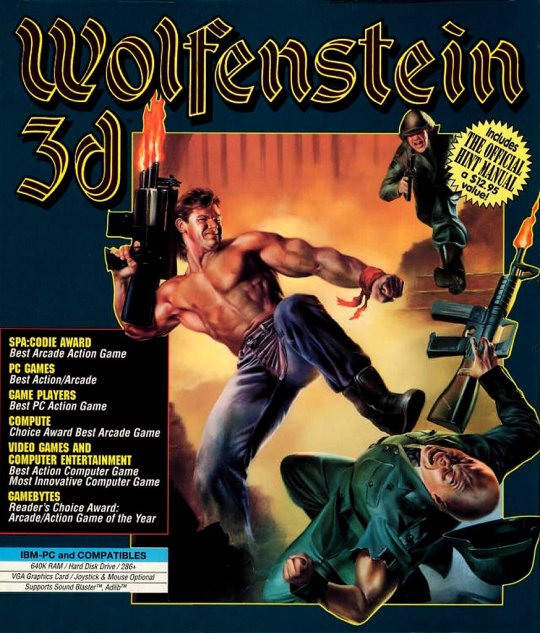

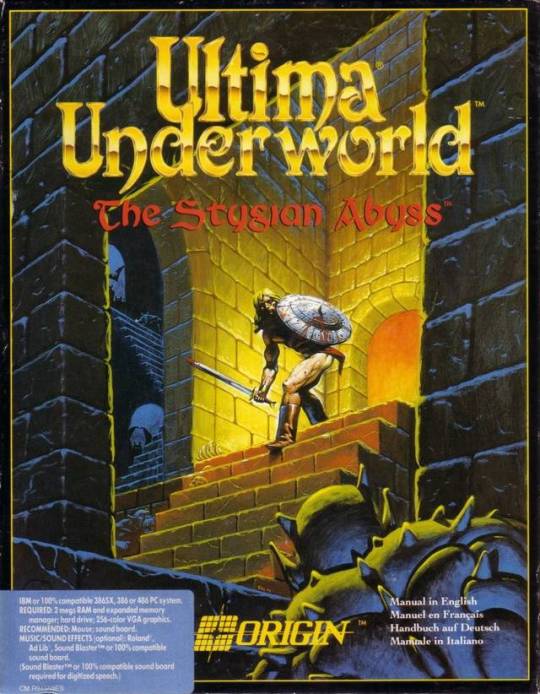
days before doom, 1992-1993
doom was a watershed moment in gaming culture. it changed everything; it rocketed id software from stardom into super-stardom, making them one of the most well-known names in the western games industry. it redefined the discussion on video game violence, climaxing in the shitstorm that surrounded the 1999 columbine shooting. and it put the first person shooter firmly on the map for good, looming large over developers, serving as the chief example of what happens when you push the envelope just that extra bit. it’s impossible to overstate just how important doom is. but the key thing about watershed moments is that there is a status before them as well as after them. in the years immediately preceding doom, the first person shooter genre was starting to grow in size, and a variety of approaches to design were prevalent. here, then, are three of doom’s immediate predecessors.
wolfenstein 3D

the early years of modern PC gaming were a strange time; the burgeoning field of home PCs (at the time called IBM-compatibles) were replacing the multitude of home computers that ran with proprietary hardware and software, with increasing parity between brands when it came to internals and a slow gravitation towards plain beige boxes (not counting some of the more experimental models.) PC game development was something of a wild west, a career for hobbyists and isolated-but-brilliant coders. id software were no different, a motley four-man crew consisting of programmers, designers and an artist, who liked heavy metal and super mario, who met working in the games department for the computer magazine softdisk but chafed under softdisk's office culture. after proving that side-scrolling games could be done on then-underpowered PCs using a technique john carmack devised, they formed id software and began "borrowing" softdisk's computers over the weekend to design their own games, to be sold independently. after getting busted by the management, they left softdisk with no criminal charges under the stipulation that they write one game every two months for softdisk for a period of time, but without any direction from softdisk.
id software were now free to pursue their own avenues of game design, with john carmack's programming genius at the helm. alongside the now-classic platformer series commander keen, carmack's experiments in writing a first person engine had resulted in early landmark titles hovertank 3D and catacomb 3D. while catacomb 3D had been the result of carmack's assertion that he could write a faster texture renderer than the fully-textured ultima underworld, which he'd seen at a CES demo in 1990, wolfenstein 3D was intended to be the next step up -- faster, more action-packed, and -- most importantly -- violent.
similar to how catacomb 3D was a first-person followup to john carmack's softdisk title catacomb, the wolfenstein franchise goes back before its “3D” entry. the series began life in 1981 under the auspices of industry legend silas warner, whose apple II classic castle wolfenstein was a vastly different sort of game. a top-down shooter, castle wolfenstein is by all accounts the first stealth game, in which the player must hide from patrolling nazis, using stealth and subterfuge to complete their objective and escape from the castle. ammunition was scarce and the player was sometimes better off holding up guards and stealing their equipment, rendering them harmless. the game was a smash hit, with a followup coming three years later.
the idea to utilize the wolfenstein name was john romero's, but they ran through a number of alternate titles beforehand, among them "hard cell," "luger me now," and "how do you duseldorf?" after meeting with silas warner himself and getting his blessing, id software went ahead with the wolfenstein name and the rest is history.

on a technical level, wolfenstein 3D was the next step up from catacomb 3D. while the basics of the engine were unchanged (textured walls, but no floors or ceilings) there were several notable updates under the hood. the most visible difference is the switch from the EGA display standard, which allowed for up to 16 colors (out of a palette of 64) to VGA, which could display up to 256 colors. that this switch was done mid-development is made plain in the somewhat limited palette in the art assets, with an abundance of shades of blue, turqouise or purple, all of which were common colors in EGA programs and games.
the second big difference was speed; players could move at an almost inhuman rate around the mazes of the game, and the focus was on action over the more sedate tactical espionage of castle wolfenstein. the emphasis on speed figured into the game design; plans for features like dragging bodies out of sight of patrolling guards were scrapped for the sake of keeping up the breakneck pace.
perhaps the standout element, of course, was the violence. sex and violence in video games and other media was an increasingly hot topic; the 80s had been marked by controversies surrounding games like custer's revenge and splatterhouse, and the legacy of 1976's death race 2000 cast a bit of a shadow as well. but nothing could have prepared the industry for what was to come in the 90s. wolfenstein 3D managed to slip in ahead of the shitstorm that id's next game, doom would get embroiled in alongside mortal kombat, but even still it drew concern from id's retail publisher at the time, formgen. artist adrian carmack (no relation to john) had long been a fan of gory themes in his work; doing the art for the relatively kid-friendly commander keen had chafed him, and he relished the opportunity to do something grotesque. hovertank 3D had been a good start, but wolfenstein 3D gave him the opportunity to really cut loose, and in response to formgen raising its concerns, he added much more violence to the art assets, the levels being dotted with skeletons and corpses, and tom hall and john romero recorded themselves screaming almost random phrases in broken german to give voice to the enemy forces. the original three episodes of the game culminated in a final battle with hitler, resulting in one of the goriest deaths ever seen on a screen at the time. (it's worth noting that this isn't the first time hitler's been exploded in a video game...)
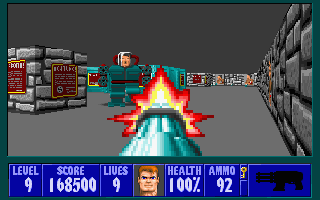
like doom, wolfenstein 3D saw a number of ports over the years; a mac version had updated graphics, but the one that most people remember is probably the SNES version, which is infamous for its censorship. gone were the nazis (hell, the bad guys didn’t even speak german anymore!) gone was the blood (it was sweat instead) and hitler himself was replaced by the generic “staatmeister.” the development of the SNES version is a particularly sore memory for id software, in part due to this censorship and in part due to the initial contractor (rebecca heineman) assigned to the porting project going AWOL.
wolfenstein 3D has a long legacy. the serious tone of castle wolfenstein had given way to a grindhouse vibe, stripping away complexity to leave one of the first pure action FPS games, where you go from point A to point B while killing everything in your way and occasionally using keys to progress. while its design was primitive compared to later games, with strictly orthogonal walls and an unchanging height, it proved the potential of the 3D engine for creating realistic environments. while the franchise has seen a couple of revivals, most recently in the utterly brilliant wolfenstein: the new order, it's wolfenstein 3D that laid the groundwork for the future, making the first person shooter popular and proving that shareware distribution was, for the time, a viable method of publishing games.
and besides, everybody loves dead nazis.
pathways into darkness

speaking of dead nazis...
if id software were once the rock gods of PC gaming, bungie were the jazz masters of mac gaming. formed by a pair of college students in the early 90s, they got their start assembling and shipping copies of minotaur: the labyrinths of crete by hand, which is a seriously humble origin given the legendary status bungie holds today as the creator of halo and destiny. their early focus on mac development was largely due to jason jones, who grew up on apple computers, but also because the field was a lot more open in mac development at the time.
after the moderate success of minotaur, they set about working on a first person shooter, inspired by wolfenstein 3D. minotaur and bungie's earlier game operation: desert storm were quirky in an intellectual kind of way; operation: desert storm came with a glossary of military terms and trivia, and authentic maps of the kuwaiti theater of operations during the gulf war. pathways into darkness was no different, which set it apart from the mindless fun of wolfenstein 3D. initially intended to be a first person version of minotaur, they chose to write an original story instead, a lengthy tale of a secret special forces mission to stop the awakening of a dreaming cosmic monster deep beneath a pyramid in the yucatan peninsula. along the way one can speak to the dead that litter the pyramid's corridors, ranging from the player character's special forces comrades to a lost nazi expedition that had entered the pyramid in the late 1930s looking for a potential superweapon.

in terms of technical stuff, the engine isn't a purely orthogonal game like wolfenstein 3D is. instead, walls are quite narrow, with beveled ends; while the underlying map design does seem to be grid-based, the grid squares appear to be much smaller than the massive blocks of wolfenstein 3D, which allows for narrow columns built out of in-game architecture rather than having to use sprites. lighting is not universal, either, and visibility fades into black off in the distance, though a flashlight pushes the darkness back a little. the initial version of the game used gradients for the walls and floors; the powerPC version finally texture maps these.
at times, the game comes off feeling more like a cross between a survival horror and an adventure game with dungeon crawler elements; a text parser requires some specific keywords for talking to the dead, and some of the puzzles are obtuse as hell, and it's entirely possible to play yourself into a corner without realizing it for hours. meanwhile, time actually passes as you play, and you only have five in-game days to complete your task. a weight limit determines how much you can carry, and healing options are limited to rare blue potions and sleeping, the latter of which uses up time. ammo is scarce until you find a certain magical item that lets you create duplicates of anything you put into it, and enemies respawn, furthering the constant threat. saving the game can only be done at save points, which are far and few between.

in spite of its difficulty (or perhaps because of it) pathways into darkness was a smash hit; it was the first native first person shooter for the mac (not counting the colony) and launched bungie into stardom, enabling them to expand their operations.
unfortunately, accessibility to this fantastic game is quite limited. mac owners will be pleased to know that it's available for free on the app store; for everyone else, there's basilisk II (or sheepshaver for the powerPC version) but setting up can be quite the chore.
in addition, art game genius brendon chung has devised his own spin on the early hours of the game in the form of doom 3 mod pathways redux.
ultima underworld: the stygian abyss

ultima and its major competitor wizardry are probably the two greatest influences on RPGs, east and west. a lot of the things we take for granted in RPGs now were invented and codified by these two series. for most of the early 80s they dominated sales, but by the early 90s they'd lost their grip on the market as their successors began to take over, especially final fantasy and other japanese series. ultima VI had shown the franchise still had the chops, but wizardry was fading fast, and by the 1990s only a cult following in japan really still cared about it. as the cRPG scene began to go dormant in the face of the rising wave of jRPGs, the bigger names began to experiment, tossing out a few spinoffs in an attempt to remain relevant. most of them weren’t successful -- the worlds of ultima series seem to have gone forgotten -- but there was at least one runaway hit.
ultima underworld: the stygian abyss began as the brainchild of paul neurath, who worked at origin systems, the company richard garriot founded to aid in publishing his ultima series, and which had grown into a huge company by the 1990s. neurath was dissatisfied with the simplistic graphics of earlier dungeon crawler games like wizardry, and wanted to create something that built on suspension of disbelief. he founded blue sky productions (not to be confused with bluesky software, creators of vectorman) with the intent of developing this game. the famous demo shown at CES 1990 came out of the early work; origin was so impressed that they offered a publishing agreement and suggested the game be rewritten as an ultima spinoff.
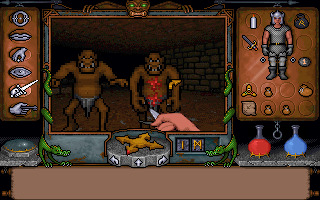
i've written a lot in this space about immersive sims; one of the more invisible aspects of immersive sims, particularly the "traditional" ones like thief and deus ex, is a development process that is perhaps more organic than that of other studios. ultima underworld was developed in such an environment, and is often described as the first immersive sim -- and indeed, it would seem to fit by most any standards, including mine. stepping away from the grid-based movement of classic dungeon crawlers like dungeon master or, yes, wizardry, realtime movement combined with more tactile world interaction pushed ultima underworld out of the hoary old dungeon crawler genre and into something a little more interesting. there's actually a surprising amount of things to see and do, and the entirety of the dungeon is open to you. in a very real sense, ultima underworld laid the groundwork for everything from deus ex to skyrim to dark souls, on top of being leagues ahead of the competition in terms of technology, with fully-textured everything, curved walls, sloped ceilings and floors, and some early 3D models. it's also singlehandedly responsible for launching the career of warren spector, whose previous production work had been wing commander II and one of the worlds of ultima spinoff games. spector would go on to produce system shock, which was in a very real sense the sci-fi counterpart to ultima underworld, and the rest is history.
of course, a game with ultima underworld’s cult popularity can’t go without a sequel. by september 1992 origin was forced by money issues to sell to electronic arts (a shocking move given garriot's long-running hatred of EA founder trip hawkins.) blue sky ended up merging with lerner research, a small outfit that mostly did flight sims, to form looking glass technologies, and it was under these auspices that ultima underworld II: labyrinth of worlds was created in 1993, with much stronger ties to the ultima franchise than its predecessor. years later, arkane studios (they of dishonored fame) would create a spiritual sequel called arx fatalis. and just as the ultima series lives on in garriot's upcoming shroud of the avatar, so too will ultima underworld, in underworld ascendant.
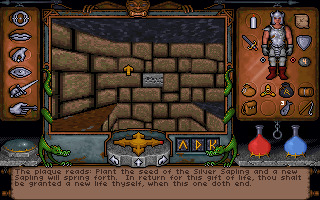
i'm on record as saying i strongly dislike ultima as a series, finding them to be mostly unplayable and difficult to take seriously, and i think garriot is a hack resistant to change, even positive change that would make his games more accessible to people other than crazy assholes who speak in faux-old english in their daily life. i find ultima underworld's controls to be clunky and its historical slowness on DOSbox has long precluded me from being able to get into it. but even i must admit that ultima underworld, and ultima as a whole, are among the most influential games ever made, which is why whenever some gaming site talks about gaming history and ignores the franchise and its influence on everything from final fantasy to bioshock, i have to wonder just how lazy they really are.
this article is a complete rewrite of an earlier entry.
history of FPS masterpost
#wolfenstein 3d#pathways into darkness#ultima underworld#id software#bungie software#looking glass software#ultima#wolfenstein#marathon#halo#history of fps#classic FPS#classic gaming
5 notes
·
View notes
Text
Sensor Sweep: John Myers Myers, Dave Duncan, Mental State, Warcraft III
Publishing (DMR Books): We’re now open for submissions! You have until the end of November to send us your best sword and sorcery stories. All the details can be found here. We’re looking forward to discovering some talented new authors!
Fiction (DMR Books): Author John Myers Myers passed on thirty years ago today. If for no other reason, his novel, The Harp and the Blade, would justify a blog post about him here on the DMR blog. However, Myers wrote many other interesting works and the arc of his life holds some interest as well.
Fiction (Hillbilly Highways): Bauserman pitched an advanced copy of Some Dark Holler to me because I reviewed a collection of Manly Wade Wellman’s Silver John stories. I get a lot of these, usually with the author comparing their work to some colossus in the field. But I couldn’t resist, being a huge fan of both country noir and speculative fiction. I didn’t remotely expect Bauserman’s work to live up to that of Wellman, a master unequaled today in my eyes.
Fiction (Sacnoth’s Scriptorium): So, now that I’ve wrapped up my current research trip among the Tolkien papers in the Marquette Archives, I’m amazed as always by how fluid and flexible the story-line of LotRs was when Tolkien was drafting the book. What really strikes me this time are the small details that seem so out of place, when their spurious sense of inevitability only comes from the fact that Tolkien did in the end pick A instead of B at a given spot.
Authors (Black Gate): Locus is reporting that Canadian fantasy writer Dave Duncan died yesterday.
Duncan was born in the small town of Newport-on-Tay, Scotland, but spent his adult life in Western Canada. His debut novel was A Rose-Red City (Del Rey, 1987), published when he was 53 years old.
In later years Duncan wrote that entering the field using his own name was a risk, due to the lingering popularity of 50s SF writer David Duncan (Dark Dominion, Beyond Eden), who published his last novel in 1957. Duncan was a vocal fan of the elder Duncan, and used “Dave” for his own published work.
Publishing (Men of the West): Why is Mental State such an important book?
It’s important because powerful people want it squashed and disappeared so badly. Colleagues at the University of Chicago warned him that this novel would ruin his career and spark riots after forty-five death threats appeared recently on his voicemail. Now he’s been de-platformed and his own law school refuses to mention the book even though they enthusiastically promote books by other professors.
Gaming/Conventions (Walker’s Retreat): It’s still a two-day convention, with all of the important stuff said on Friday, so today’s post is a roundup of what Blizzard and friends announced.
Before the show started, Bungie made Destiny 2 on PC free for all Bnet usersto keep until the 18th.
They’re doubling-down on the esports for as many of their properties as they can pull off.
Starcraft 2: Zeratul as Co-Op Commander; Google Deep Mind crew is back to show off their AI work.
Gaming (Jeffro’s Space Gaming Blog): I still have time to get a good read in, though. Most recently I got ahold of Fenton Wood’s Pirates of the Electromagnetic Waves… which pivots effortlessly between weird pulp horror, fairy stories and tall tales. Here’s my tweet-sized review:
What this book does is it takes all of the subversive, dystopian impulses of science fiction between 1940 and 1980 and it turns it all inside out. This is the kind of fiction we could have had if publishing had not been weaponized and turned toward cultural suicide.
Fiction (John C. Wright): Rogues in the House, the seventh published Conan story, first was published in Weird Tales, January 1934.
Here, Robert E Howard has finally hit his stride: the characters, the action, and above all the theme leap vividly from the page and into a permanent place in the reader’s imagination. This is a fan favorite, and for good reason. If you want to introduce Conan to someone who has never read a Hyborian Age tale, this is the one to recommend.
And I do recommend it. Please read no further if you have not read it, because I must spoil several clever twists in order to discuss them.
Gaming (Niche Gamer): When Blizzard recently announced a remaster for their legendary real-time strategy game, Warcraft III, many fans wondered just how much of the game was being changed underneath its fresh new coat of HD paint.
Now, we’ve learned the remaster – subtitled Warcraft III: Reforged – will have an online multiplayer component that is fully compatible with the original Warcraft III online multiplayer, among other new details.
Yes, this means users loading up the ridiculous 4K remaster of the beloved RTS will be able to play it online with holdout grognards that are still logging into that same old lions gate portal – for a game that launched back in 2002.
Fiction (Kairos): Author Yakov Merkin announces the exciting Indiegogo campaign for the third installment in his galaxy-spanning sci-fi series, Galaxy Ascendant.
Do you miss the days when grand, epic sci-fi franchises like Star Wars and Mass Effect were good? Do you want grand-scope, creative, action-packed, and FUN space opera fiction?
Then come on over to the Galaxy Ascendant! We have action, adventure, romance, space battles that are among the largest in all of space opera fiction, and truly heroic characters!
Readers have only great things to say about the series so far, and A Shifting Alliance takes it to a whole new level.
Gaming (Table Gaming News): Funforge is running a Monumental Kickstarter campaign. That describes both the name of the game as well as is an accurate description of what the game encompasses. It’s not just your standard 4x civilization board game, but it also brings in deck-building mechanics as well. If there’s a mechanic you like in those types of games, it’s probably in here.
Game Blogging (Hack & Slash): I’m Bowing Out
Politics, Violence, Social Media, and Dungeons and Dragons
I’ve not written this post several times. It will be intensely personal, brutally honest, and not directly about gaming resources. It is likely something in this post might trigger you, regarding abuse, sexuality, or mental illness. It is filled with ups and downs, trials and travails, good and evil, hope and loss.
Cinema (Noblebright): Arthur is trying to get the other knights to accept him as king. Some of them, such as Uryens, refused to have a bastard for a king and chose instead to make war on Arthur’s ally, Leondegrance (played by Patrick Stewart in the movie clip). Arthur rides to Leondegrance’s castle to aid in its defense. This is his first act of feudal loyalty; he’s just one boy with a sword and not much in the way of armor, but he has a moral duty to come to the aid of his besieged supporter, so that’s what he does. He kills some of the enemy, then leaps from the parapet and tackles Uryens in the moat.
Sensor Sweep: John Myers Myers, Dave Duncan, Mental State, Warcraft III published first on https://medium.com/@ReloadedPCGames
0 notes
Text
Iron Lord Saladin Forge
Season of the Lost dropped some major lore about Saladin and I love every piece of it so I will make a huge post detailing stuff about and what's important.
The lore is on Iron Banner armour which you can see in-game when you go to the armour section. The lore is the same on each class so it doesn't matter which one you read. It's in the order of how armour is set, so helmet -> arm piece -> chest piece -> leg piece -> class item. There's some extras on Iron banner weapons that I'll add as well.
The rest under the cut due to length and also spoilers!
I'll link to the Hunter gear because I'm a dirty Hunter main and I read it from there and that's what I have open because I couldn't remember the names for other two classes, but the lore is the same on all of them. The set is called Iron Forerunner.
We haven't really had any substantial Saladin lore in D2 besides few lore pieces from Chosen and Splicer. Not nearly enough I think, especially since he wasn't properly introduced in D2 at all and it was kinda assumed that everyone would know about him from the Rise of Iron expansion in D1. He had plenty of voice lines, but with no real context. His voice lines in Season of the Chosen were interesting, but also made a lot of people think he's a bad person and a warmongering coward who sat on his butt during the Red War and was then preaching action for action's sake.
The situation is obviously more complex, but I've always said that it's Bungie fault for not explaining more about him prior to his involvement in the Season of the Chosen. Well, now we got some really interesting information at last!
Anyway, helmet first!
Flavour text:
"Some know the legend. We threw ourselves on the blades of tyranny so others may live free." —Lord Saladin
This is referencing the Iron Lords' fight against the Warlords in the Dark Age. Saladin is heavily influenced by his time in the Dark Age. It seems like some really old Guardians never get over the trauma of living through that (Drifter is another example).
Side note: this could also be referencing the battle against SIVA since Rasputin is also known as "The Tyrant." It's not fully relevant tho, as Saladin was equally affected by both periods in his life.
This first entry details something we don't really think about when it comes to Guardians: death. It's a temporary thing with them so it doesn't really matter. But Saladin recounts how he remembers his deaths and how each one felt. Despite the fact that he will be brought back, the pain and struggle of dying are very real. There is also the associated trauma of the realisation that you will go through this over and over and over:
He laughed when his Ghost reassembled him. Then, he cried.
It's not something mentioned often, and definitely wasn't a point raised with Saladin. It gives some context to how seriously he takes combat, training and the lives of his fellow Guardians.
Saladin remembers the day he stopped counting deaths. "Something about you is different," Jolder had said, and put her hand on his.
This explains that his worldview of the role of Lightbearers changed the moment he was invited to become an Iron Lord. It's also important to remember that he loved Lady Jolder very much (in whichever way you want to interpret it) and that watching her make the choice to die a final death has had a heavy impact on him.
Saladin remembers all this and more when he looks at the Crow. He feels rage form a hot pit in his belly when Osiris tells him about the young Lightbearer's suffering at the hands of his fellow Guardians. Osiris asks him if he can keep a secret.
"I don't like secrets," Saladin says, and that's the end of it.
Saladin doesn't really say this during Chosen and his interactions with Crow, but it's evident from this that he cares deeply about the young Light who suffered in ways Saladin only remembers people suffering during the Dark Age. It's also important to note that the Osiris he speaks to here is Savathun. Saladin seems to be uniquely unaffected by Savathun's schemes. This will repeat itself again later.
Second, arms piece.
Flavour text:
"Some know the legend. We were forged in the fires of a burning world." —Lord Saladin
Same thing as before. Referencing the post-Collapse Dark Age. The lore tab details a really tragic story of the Iron Lords burying bodies, including the implication of Saladin burying the body of a child. He recalls that these people were victims of Fallen Raiders.
"It's a vicious circle," Efrideet had said as she tied off a funeral shroud with great care. Saladin remembers the bundle being very small. "One day, I'm going to break it."
Saladin remembers how easily the body fit in his arms, how light it felt as he laid it in the grave. He remembers, with shame, pretending not to hear Efrideet's words so he wouldn't need to respond to them.
He remembers not having anything kind to say.
He obviously regrets not having a stronger stance on this in the past. Where Efrideet seems to have always been keen on ending the cycle of violence, he clearly thought differently and is now ashamed of it. This transitions into more about his relation to Crow:
Saladin remembers all this and more whenever the Crow talks back to him. Sometimes, he bites down on the inside of his cheek. Sometimes, he looks up to find his Ghost focused on him with a knowing look.
He doesn't say anything to his Ghost either.
Because Crow was saying things that reminded him of Efrideet. Breaking the cycles of violence, extending a friendly hand, not treating everyone like an enemy. It's evident that this turmoil is still inside of him as someone who spent most of his time fighting for survival, only to be told by those younger than him that there's a way out of that war. It's a very common struggle of people dealing with trauma and specifically PTSD to not be able to imagine and/or live in a world of peace and to outright reject the possibility of peace ever existing. Saladin is very clearly dealing with that and here, we see it from his own POV: despite sometimes being harsh to Crow, there were times when he chose to say nothing because deep down he knows that Crow is right. Accepting that is a long process though.
Third, chest piece.
Flavour text:
"Some know the legend. We rose from the ashes of a dying world to save humanity from itself." —Lord Saladin
Same again, but this is an interesting way to phrase it. He's talking about humanity being a danger to itself, not about any external threat. Ultimately, the Traveler's gift was the first thing that harmed humanity post-Collapse, despite later being the thing that saved it.
This leads into Saladin's thoughts on the Red War, something we've been sorely missing for a very long time.
Saladin remembers losing his connection to the Light. He remembers thinking that the Traveler must have discovered his most secret doubts; the darkest thoughts he shared with no one—not even his Ghost. He remembers the strange sense of relief that had washed over him until his radio crackled to life just moments later.
His deepest secret? Probably that Light is a burden. When he lost the connection to the Light, he specifically thought it had only happened to him and then felt relief. Freedom from the eternal war he has to keep waging. I'm sure he feels incredible shame for thinking it would be better to just lose the Light and die a final death, but alas, he is bound by duty. Especially a Titan's duty.
He stands there thinking about it for a while before finally deciding to embrace that duty. And now we know what he was doing during the Red War:
"Saladin," his Ghost said again, and Saladin remembers moving. He remembers clutching his radio and rallying survivors—those strong enough to make the journey—to the Iron Temple.
It's been abbreviated as him "sitting out" the Red War because he didn't fight. Of course it was strange that the last remaining active Iron Lord did not show up to the City to fight alongside all the others, both Guardians and ordinary humans. That Lord Saladin, someone who endured so many hardships and fought so many battles since the Dark Age, hasn't come to help humanity in its time of greatest need.
But now this hits different. He didn't fight, yes. He couldn't. Losing the Light wasn't just something that made him scared (like all Lightbearers): it was something that made him scared of how he might actually enjoy dying a glorious final death. To end the trauma and the memories of all the horrors he's been through. So instead of throwing himself into a reckless death, he chose to stay in the Iron Temple and protect survivors.
So yeah, he didn't fight, but he did something equally important. The Iron Temple is an extremely well protected fortress that's very difficult to reach and breach, so any survivor he gathered was perfectly safe there until the Red War ended. Sometimes "sitting out" is more noble than fighting.
Saladin remembers all this and more whenever the Crow challenges him on his cowardice during the Red War. He wants to break the young Guardian's back to teach him a lesson about what it's like to feel helpless, but something stops him.
He remembers hearing stories about the Crow's life on the Shore before he arrived at the Tower, and does not raise a hand against him.
The lore entry ends with telling us that Saladin was clearly very agitated about Crow's teasing. But in the end, he remembered what Crow has been through and realised that Crow already knows what it's like to feel helpless. He did not need a reminder and Saladin decided to take the teasing without a response. It truly frames some of those voice lines in a different light, knowing this background.
Fourth, leg piece!
Flavour text:
"Some know the legend. We crossed a burning world with sword in hand, bringing justice and blood." —Lord Saladin
Once more, we are told that Saladin was mostly forged (eheh) through his experience in the Dark Age.
The lore page details a bittersweet memory Saladin has of him with his fellow Iron Lords and friends enjoying some good time over a meal and song.
He remembers Radegast asking him to sing the song taught to them by the people of the blacksmith's village, but agreeing only when Jolder and Perun promised to join in. Their voices rose like wolves in the night and were so raw by morning that none of them could speak.
This is honestly heartbreaking. Saladin being this happy and free to sing and enjoy himself: compared to how he is now. But even with that, he has retained the need to do it again sometimes, if he ever finds people to be comfortable around.
Saladin remembers all this and more when Zavala tells him Amanda has taken the Crow out to drink in the City's streets. He wonders what song they'll sing, if it's anything like the one he's heard everyone humming lately—even though he hasn't tried it himself.
I love how he projects his past joy onto the two young people and wonders if they'll do the same as he did once. Here we also get another hint about Saladin apparently not being affected by Savathun's viral chant. It might be a point relevant in the future.
Finally, class item!
Flavour text:
"Some know the legend. We crushed the Warlords beneath our heel so that they may never rise again." —Lord Saladin
Nothing new here. Just Saladin recounting how hard they went against the Warlords.
The rest is a very poignant lore page that details the relationship between Saladin and Zavala. Zavala studied under Saladin who was his mentor and it's been repeated often that Saladin has retained a "soft spot" for him.
Saladin remembers the first time he met Zavala. He remembers thinking that the Awoken had regal bearing like the stags he once hunted on the Steppes. His shoulders were broad, and his chin held high. When he moved, he did so with the strength and purposeful deliberation of someone with the power to determine his own place in the world.
"You'll never have a son," his Ghost had said, "but it isn't too late for you to take an apprentice."
I love when non-Awoken describe Awoken, there's always something ethereal about it. But I'm mostly putting this part here because of what Saladin's Ghost says.
First, I am incredibly soft for older Guardians adopting younger ones as kids and teaching them. Easily my favourite dynamic ever. Saladin seeing Zavala as a son makes me cry a thousand tears.
And second, is this finally a full confirmation that Guardians cannot bear children? It's kind of a strange place to put it, but it seems to be the implication. It makes sense they wouldn't be able to, but it's also nice to have some direct lore information about it in case it pops up as a question. I'm sorry if this ruins anyone's fics.
Saladin remembers their sparring matches. He remembers how Zavala always got back on his feet, no matter how many times Saladin put him down. He remembers refusing to offer the younger Lightbearer a hand up. Until the day Zavala finally bested him in combat.
He remembers lying flat on his back, left shoulder dislocated and ribs shattered, a strange pressure on his chest that made it difficult to breathe.
"Finish it," Saladin had commanded because that was the way of things. His Ghost would revive him.
Saying nothing, Zavala hauled him to his feet instead.
I love how this is placed at the end, paralleling the beginning of Saladin remembering his deaths and the pain of dying. But instead of "finishing it," Zavala pulls him back up. It's definitely something Saladin hasn't experienced before, especially not before becoming an Iron Lord, when all of his deaths were just gruesome ends to a struggle. Then seconds after, he'd be back up. He took the revival for granted, until Zavala offered him the alternative. Again, an interesting perspective about something we don't usually think about much. I do wonder how Saladin healed afterwards though.
Saladin remembers all this and more when his former apprentice calls him into his office and tells him about the face behind the Crow's mask. Zavala says he knows that Saladin doesn't like secrets; that it's unfair to ask him to keep one of this magnitude, but there will come a time when the Crow needs someone—the way Zavala needed Saladin.
"You never needed anyone," Saladin insists.
Zavala only smiles.
This page ends with the two bonding again. Despite their differences and disagreements, there's mutual respect between the mentor and the apprentice. The father and the son.
And Saladin thinks Zavala never needed him, but that is obviously not true and Zavala tells him so. He also tells him that Crow, and implied Guardians like him, will need the same guidance.
It gives us a full circle back to Saladin's musings about his purpose as a Guardian and Lightbearer. He may have doubted his place in the world before, but seeing as he's still here with us and actively participating and helping; training us through Iron Banner, helping with the Eliksni, refusing to side against the Vanguard despite the difference in opinion, now serving as Zavala's ambassador for the Cabal and easily bonding with someone he would've considered an enemy not long ago...
I think Saladin knows his place. He's one of the strongest Lightbearers and most principled among them. He is not swayed by lies and deceptions, he does not abide by them and speaks plainly. He has deeply rooted beliefs in justice and he will not compromise himself, even if it means conceding his position to make peace with a former enemy when that enemy proves their worth, honesty and good intentions to him.
He is a Guardian.
He is an Iron Lord.
#destiny 2#lord saladin#lore vibing#long post#more iron lord lore bungie please?#iron temple as a social space?#please?#anyway i love this new lore about him so much#i wish we had it before people formed some crude opinions about him#but hopefully this can retroactively clear certain things up
97 notes
·
View notes
Text
Another reason the “The Darkness isn’t evil, it’s just a force of nature” argument isn’t true.
The Light is life and the Darkness is death, this is obvious from their roles in the garden. The Light planted flowers and the Darkness winnowed them. These are both good things, as the Nine tell us, both worlds with only Light or only Darkness are unbalanced and cause only suffering.
But when disagreement rose, it was the Darkness that found a knife in their hand. And the Darkness who decided to use it.
I looked at the gardener. I looked at my hands. I discovered the first knife.
[...]
I won, because the gardener always stops to offer peace. And when they do, I always strike.
The when fighting for their life because the Darkness wanted to murder them, the Light kept stopping to offer peace, a way to end conflict without violence. And instead of considering it, the Darkness took it as an opportunity to attempt to kill them. Again and again.
The Light is life and the Darkness is death, but the Light chose to be peace, and the Darkness CHOSE to be violence.
...Of course, “The Darkness is violent and evil” is pretty evident from their introduction in “XXXII: Majestic. Majestic.” but, y’know, some people don’t like to read.
Update: Also I just remembered Bungie even wrote an entry to debunk this theory lmao (Spoilers, it’s from Eris’ weekly lore book pages)
142 notes
·
View notes